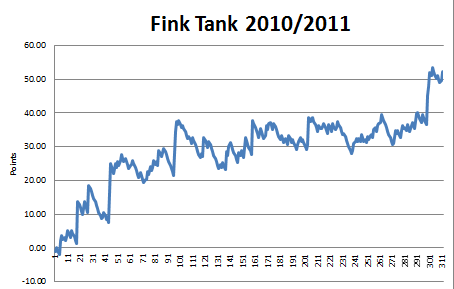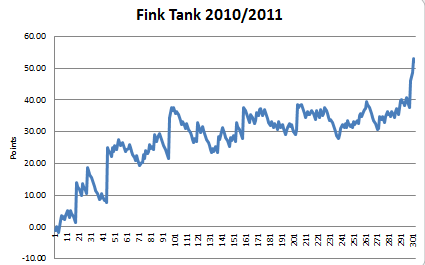Fink Tank provide predictions on football games based on their model which is roughly based around shot on target. We tested their English Premier League ratings in the 2010/2011 season were very pleased with the results, returning over 50 points level stakes profit.
How we tested it:
For our test, we use the predictions from Fink Tank/ Dectech and only bet when the predicted % chance is better than the predicted chance implied by the available bookmaker odds.
Fink Tank/ Dectech provide their predictions in the form of estimated probabilities for the home win, draw and away win. You can then compare this to the available odds to assess whether a particular game offers value.
Here’s how the probabilities are displayed by Dectech/ Fink Tank

For example if the game is Blackburn vs Wolves, Fink Tank might give Blackburn a 51.4% chance. This means that according to the ratings, Blackburn should win 51.4 times out of a hundred.
Finding value
The next step is to find out if those ratings offer value. The ratings might give Man U a 68.3% chance of an away win against Blackpool, but are the bookies taking this into account with the odds they are offering?
Here’s how:
Step 1) First we need to compare like for like. This means we need to see what the ratings percentages are equivalent to in bookie odds. To work this out, divide 100 by the predicted percentage. So for the Man U game, divide 100 by 68.3. This gives decimal odds of 1.46.
Step 2) Check for value. Now use an odds comparison site such as www.oddsportal.com. If the bookmakers are offering odds above 1.46 on Man U to win, it means there is value in the bet, but if they’re offering odds below 1.46 it means they are being too tight with the odds.
The difference between the predicted probability and the available odds gives you a measure of the % value available.
Here’s a typical table that we worked with:

Ratings Performance in 2010/2011.
We took this value betting approach last season to test the ratings. This meant we’d bet on the team if their predicted chance was greater than the chance implied by the bookie odds. E.g. Dectech gave Bolton 53% chance, the bookies only gave them a 45% chance. It doesn’t mean you’re going to win, just that you are more likely to win that the odds imply.
A point is equivalent to a mythical £1 on every bet.

Here’s the home & away comparison.
| Bets | Profit | ROI |
| All bets | 310 | 52.37 | 16.89% |
| Homes | 153 | 26.6 | 17.00% |
| Aways | 152 | 27.6 | 18.00% |
The ratings performed superbly last season when taking this value betting approach. As good as these results appear, it certainly wasn’t a smooth ride with the profits coming in fits and starts, usually as big winners were landed. Notable highlights included West Brom to beat Arsenal away at 17.50, Newcastle to beat Arsenal away at 13.04, Wigan to beat Spurs away at 12.59 and Wolves to beat Liverpool away at 10.00. These four bets alone account for the bulk of the profits made over the season! This is worth bearing in mind before we read too much into last season’s results.
You can check our testing posts from last season with this link.
2011/2012 Season.
This season we’ll be posting the full list of value picks exclusively on our members’ betting forum, but we will continue to post up a couple of games each week here.
A word of warning though in that the ratings may be a little off in the first few games of the season if they are based on last year’s stats, so we suggest caution in the first few weeks.
As an example, here are 3 of the top value bets from the first weekend of betting in the Premier League this season.
Fink Tank
- Newcastle Utd – Arsenal: Newcastle @ 4.33 Corals = 23.84% Value.
- Fulham – Aston Villa: Fulham @ 2.2 Various bookies = 4.5% Value.
- QPR – Bolton: Bolton @ 3.47 Pinnacle Sports = 37% value
To get the full list of qualifiers each week, sign up to the Smart Betting Club today.




